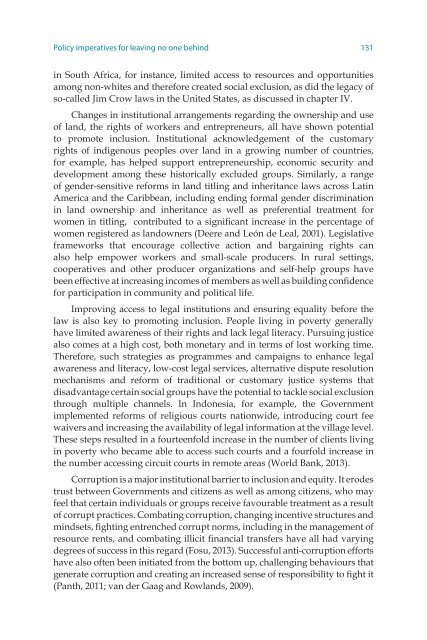Leaving no one behind the imperative of inclusive development
full-report
full-report
Create successful ePaper yourself
Turn your PDF publications into a flip-book with our unique Google optimized e-Paper software.
Policy <strong>imperative</strong>s for leaving <strong>no</strong> <strong>one</strong> <strong>behind</strong> 131<br />
in South Africa, for instance, limited access to resources and opportunities<br />
among <strong>no</strong>n-whites and <strong>the</strong>refore created social exclusion, as did <strong>the</strong> legacy <strong>of</strong><br />
so-called Jim Crow laws in <strong>the</strong> United States, as discussed in chapter IV.<br />
Changes in institutional arrangements regarding <strong>the</strong> ownership and use<br />
<strong>of</strong> land, <strong>the</strong> rights <strong>of</strong> workers and entrepreneurs, all have shown potential<br />
to promote inclusion. Institutional ack<strong>no</strong>wledgement <strong>of</strong> <strong>the</strong> customary<br />
rights <strong>of</strong> indige<strong>no</strong>us peoples over land in a growing number <strong>of</strong> countries,<br />
for example, has helped support entrepreneurship, eco<strong>no</strong>mic security and<br />
<strong>development</strong> among <strong>the</strong>se historically excluded groups. Similarly, a range<br />
<strong>of</strong> gender-sensitive reforms in land titling and inheritance laws across Latin<br />
America and <strong>the</strong> Caribbean, including ending formal gender discrimination<br />
in land ownership and inheritance as well as preferential treatment for<br />
women in titling, contributed to a significant increase in <strong>the</strong> percentage <strong>of</strong><br />
women registered as landowners (Deere and León de Leal, 2001). Legislative<br />
frameworks that encourage collective action and bargaining rights can<br />
also help empower workers and small-scale producers. In rural settings,<br />
cooperatives and o<strong>the</strong>r producer organizations and self-help groups have<br />
been effective at increasing incomes <strong>of</strong> members as well as building confidence<br />
for participation in community and political life.<br />
Improving access to legal institutions and ensuring equality before <strong>the</strong><br />
law is also key to promoting inclusion. People living in poverty generally<br />
have limited awareness <strong>of</strong> <strong>the</strong>ir rights and lack legal literacy. Pursuing justice<br />
also comes at a high cost, both m<strong>one</strong>tary and in terms <strong>of</strong> lost working time.<br />
Therefore, such strategies as programmes and campaigns to enhance legal<br />
awareness and literacy, low-cost legal services, alternative dispute resolution<br />
mechanisms and reform <strong>of</strong> traditional or customary justice systems that<br />
disadvantage certain social groups have <strong>the</strong> potential to tackle social exclusion<br />
through multiple channels. In Ind<strong>one</strong>sia, for example, <strong>the</strong> Government<br />
implemented reforms <strong>of</strong> religious courts nationwide, introducing court fee<br />
waivers and increasing <strong>the</strong> availability <strong>of</strong> legal information at <strong>the</strong> village level.<br />
These steps resulted in a fourteenfold increase in <strong>the</strong> number <strong>of</strong> clients living<br />
in poverty who became able to access such courts and a fourfold increase in<br />
<strong>the</strong> number accessing circuit courts in remote areas (World Bank, 2013).<br />
Corruption is a major institutional barrier to inclusion and equity. It erodes<br />
trust between Governments and citizens as well as among citizens, who may<br />
feel that certain individuals or groups receive favourable treatment as a result<br />
<strong>of</strong> corrupt practices. Combating corruption, changing incentive structures and<br />
mindsets, fighting entrenched corrupt <strong>no</strong>rms, including in <strong>the</strong> management <strong>of</strong><br />
resource rents, and combating illicit financial transfers have all had varying<br />
degrees <strong>of</strong> success in this regard (Fosu, 2013). Successful anti-corruption efforts<br />
have also <strong>of</strong>ten been initiated from <strong>the</strong> bottom up, challenging behaviours that<br />
generate corruption and creating an increased sense <strong>of</strong> responsibility to fight it<br />
(Panth, 2011; van der Gaag and Rowlands, 2009).
















